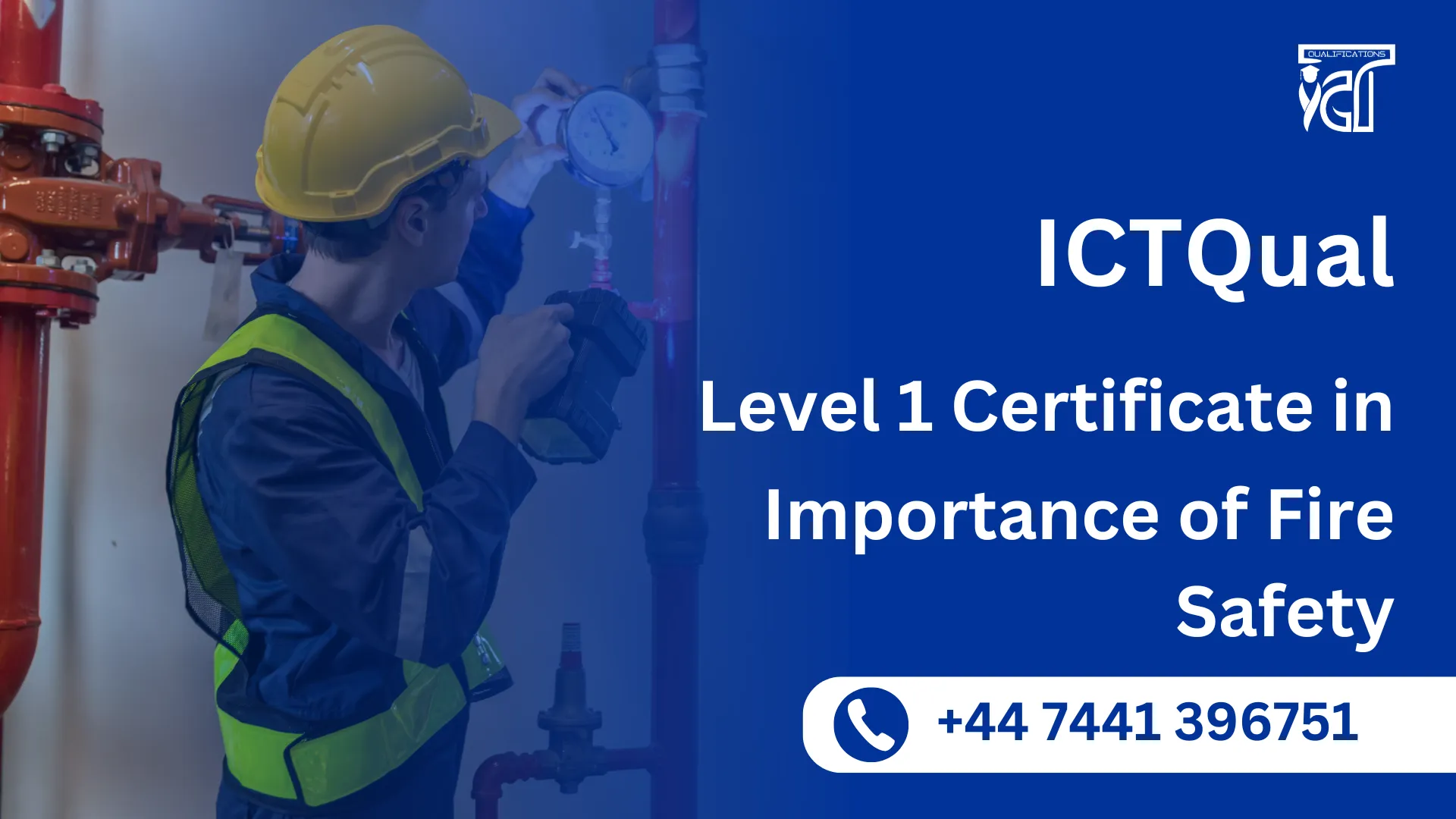In today’s fast-paced and highly regulated working environments, fire safety is more than just a legal requirement—it is a critical element of a responsible and proactive workplace culture. The ICTQual Level 1 Certificate in Importance of Fire Safety provides a solid introduction to fire safety principles, ensuring that individuals understand the basic risks, preventive measures, and emergency responses required to maintain a safe environment.
Whether you’re a new employee, a small business owner, or an organization looking to raise awareness among staff, this entry-level certification lays the groundwork for effective fire safety management.
The ICTQual Level 1 Certificate is an introductory qualification designed to raise awareness of fire safety in the workplace. It covers the fundamental principles of fire prevention, basic fire behavior, and the responsibilities of individuals when dealing with potential fire hazards. The course is tailored for those with little or no prior knowledge of fire safety, making it an excellent starting point for learners at all levels.
This certification aligns with fire safety regulations and supports compliance with legal duties under acts such as the Regulatory Reform (Fire Safety) Order 2005 in the UK and similar standards globally.
Participants gain a clear understanding of what causes fires, how they spread, and what immediate actions can prevent escalation. The course empowers individuals to recognize hazards and apply basic preventive measures.Employers are legally obligated to provide fire safety training to staff. The ICTQual Level 1 Certificate helps meet these legal requirements, supporting risk mitigation and regulatory compliance in the workplace.
Fire safety is everyone’s responsibility, and the ICTQual Level 1 Certificate in Importance of Fire Safety is the perfect introduction to building that responsibility across your workforce. By providing essential knowledge in a structured and accessible format, this course helps individuals and organizations take the first step toward safer working environments.
Investing in fire safety training not only protects lives and property—it also supports a stronger safety culture and demonstrates professional integrity.
ICTQual Level 1 Certificate in Importance of Fire Safety
The ICTQual Level 1 Certificate in Importance of Fire Safety qualification consists of 5 units for the completed qualification.
- Fundamentals of Fire Safety and Risk Identification
- Fire Prevention Techniques and Workplace Safety Measures
- Emergency Fire Response and Safe Evacuation Planning
- Legal Responsibilities and Fire Safety Compliance
- Firefighting Equipment and Proper Handling
GLH (Guided Learning Hours) and TQT (Total Qualification Time) are terms commonly used in vocational qualifications to help define the amount of time a learner is expected to spend on their studies.
1. GLH (Guided Learning Hours)
GLH refers to the number of hours a learner spends being directly taught, supervised, or supported during their course. This includes the time spent in activities such as:
- Classroom instruction
- Practical workshops
- One-on-one tutoring or mentoring sessions
- Online learning sessions with tutor support
In other words, GLH represents the time that learners are actively engaged with their instructors or learning activities.
2. TQT (Total Qualification Time)
TQT represents the total amount of time a learner is expected to invest in completing a qualification, including:
- GLH (Guided Learning Hours): Time spent on direct learning, as explained above.
- Self-Directed Learning: This includes time spent on independent study, research, assignment completion, preparation for exams, and any other work the learner does outside of direct teaching hours.
TQT is a broader measure that includes all the time required to achieve the qualification. It helps learners and employers understand the overall commitment required for the qualification.
Key Differences Between GLH and TQT:
- GLH focuses on direct learning with guidance or supervision.
- TQT includes GLH as well as independent study time and other learning-related activities.
Example:
If a qualification has a TQT of 600 hours and a GLH of 250 hours, it means the learner should spend 250 hours in direct learning (classroom, online, or tutor-led sessions) and 350 hours on independent study or research.
Here are the learning outcomes for each study unit:
Fundamentals of Fire Safety and Risk Identification
- Learn the essential principles of fire safety.
- Understand how to identify fire hazards and associated risks.
Fire Prevention Techniques and Workplace Safety Measures
- Recognise fire prevention techniques applicable to workplaces.
- Learn methods to improve overall fire safety.
Emergency Fire Response and Safe Evacuation Planning
- Understand fire emergency response procedures.
- Learn how to create and implement safe evacuation plans.
Legal Responsibilities and Fire Safety Compliance
- Identify key legal responsibilities related to fire safety.
- Understand the importance of regulatory compliance.
Firefighting Equipment and Proper Handling
- Recognise different types of firefighting equipment.
- Learn the correct handling and maintenance procedures.
Benefits of the ICTQual Level 1 Certificate in Importance of Fire Safety
- Foundational Fire Safety Knowledge – Provides essential understanding of how fires start, spread, and can be prevented, making it ideal for beginners.
- Supports Legal Compliance – Helps organizations meet mandatory fire safety training requirements in accordance with workplace safety legislation such as the Regulatory Reform (Fire Safety) Order 2005.
- Promotes a Culture of Safety – Encourages staff awareness and shared responsibility, contributing to a safer, more prepared working environment.
- Basic Emergency Response Skills – Teaches how to act during a fire emergency, including evacuation procedures and the correct use of fire safety equipment.
- Relevant Across Industries – Suitable for all sectors including retail, hospitality, healthcare, education, and offices where fire safety awareness is essential.
- Ideal for Induction and Entry-Level Training – Serves as an effective part of onboarding programs for new employees or volunteers, ensuring everyone starts with the same safety knowledge.
- Flexible and Time-Efficient Learning – Can be completed in a short time, with accessible delivery formats such as online or in-person sessions.
- Recognized Certification – Offers a credible, employer-recognized qualification that adds value to an individual’s professional profile.
- Boosts Confidence and Awareness – Equips individuals with the confidence to respond appropriately in fire-related situations, reducing panic and improving outcomes.
- Cost-Effective for Organizations – A practical and affordable way to ensure fire safety training is delivered to all staff without disrupting operations.
Best Fit for the ICTQual Level 1 Certificate in Importance of Fire Safety
The ICTQual Level 1 Certificate in Importance of Fire Safety is best suited for individuals who are new to fire safety or require a basic understanding of fire prevention and emergency procedures. It is ideal for:
- New Employees – Especially those undergoing induction or onboarding processes in any industry.
- Frontline and Entry-Level Staff – Working in sectors such as retail, hospitality, healthcare, education, offices, or manufacturing.
- Volunteers and Temporary Workers – Who need quick, essential training to meet safety standards.
- Small Business Owners and Employees – Who handle multiple roles and need foundational fire safety awareness.
- Students and Job Seekers – Looking to enhance their CVs with a recognized, entry-level health and safety qualification.
This course is particularly beneficial for organizations looking to build a baseline of fire safety awareness across their teams, ensuring that all staff understand their responsibilities in preventing and responding to fire-related risks.
Entry Requirements
Register Now
Qualification Process
Qualification Process for the ICTQual Level 1 Certificate in Importance of Fire Safety
- Self-Assessment:
Begin by evaluating your eligibility to ensure you meet the qualification requirements, including work experience, knowledge, and language proficiency. - Registration:
Complete your registration by submitting the required documents, including a scanned copy of a valid ID, and paying the registration fee. - Induction:
An assessor will conduct an induction to confirm your eligibility for the course and explain the evidence requirements. If you do not meet the criteria, your registration will be canceled, and the fee will be refunded. - Assignmnets & Evidence Submission:
Provide all assignmnets and the necessary evidence based on the assessment criteria outlined in the course. If you are unsure of the required evidence, consult with the assessor for guidance on the type and nature of evidence needed. - Feedback and Revision:
The assessor will review your submitted evidence and provide feedback. Evidence that meets the criteria will be marked as “Criteria Met,” while any gaps will be identified. You will be asked to revise and resubmit if needed. - Competence Evidence:
Submit final evidence demonstrating that all learning outcomes have been met. This evidence will be marked as “Criteria Met” by the assessor once it is satisfactory. - Internal Quality Assurance (IQA):
The Internal Quality Assurance Verifier (IQA) will review your evidence to ensure consistency, quality, and compliance with standards. - External Verification:
The IQA will submit your portfolio to ICTQUAL AB External Quality Assurance Verifiers (EQA) for final confirmation. The EQA may contact you directly to verify the authenticity of your evidence. - Certification:
Upon successful completion of all checks, ICTQUAL AB will issue your official certificate, confirming that you have attained the ICTQual Level 1 Certificate in Importance of Fire Safety.







